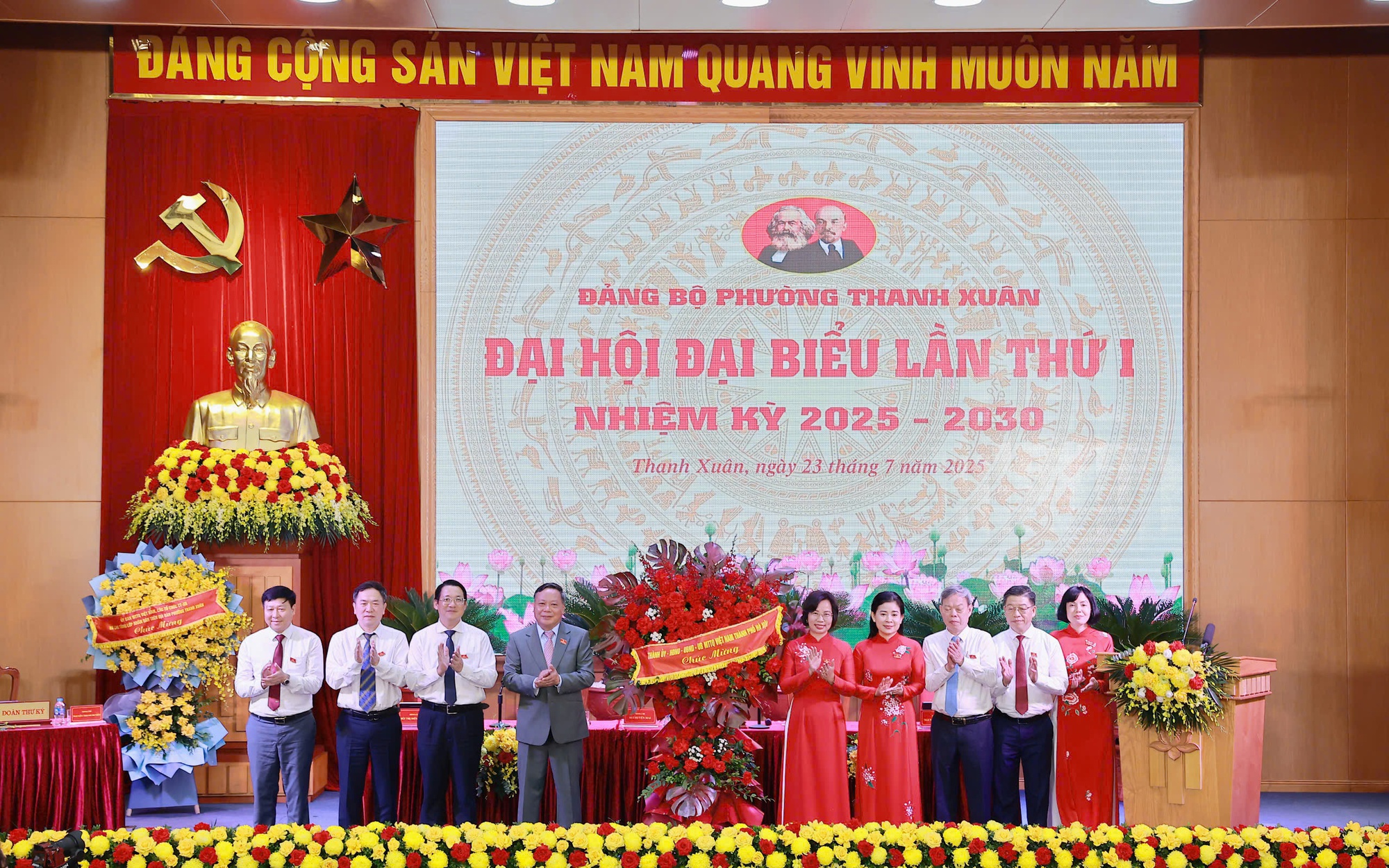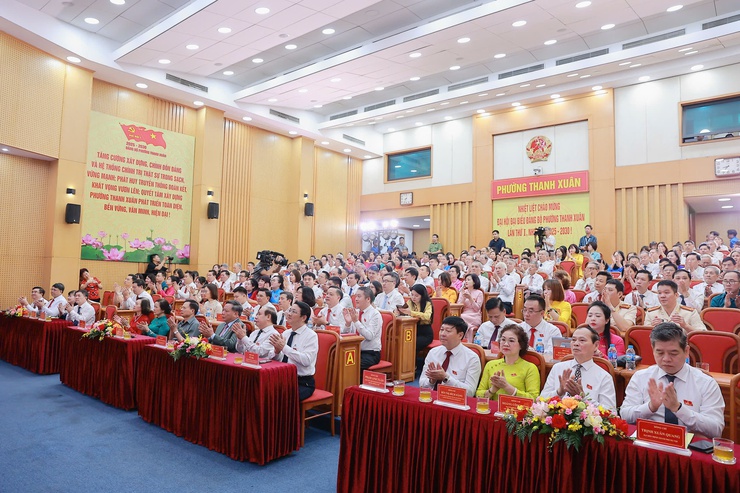Nguyen Van Phong, Standing Deputy Secretary of the Hanoi Party Committee, attended and delivered key directives. Also present were prominent former leaders including Tran Van Tuan, former Member of the Central Committee of the Communist Party, former Minister of Home Affairs, and former Standing Deputy Secretary of the Hanoi Party Committee; Ngo Thi Doan Thanh, former Member of the Central Committee, former Deputy Head of the Central Mass Mobilization Commission (now merged with the Central Propaganda and Mass Mobilization Commission), and former Chairwoman of the Hanoi People's Council; and Nguyen Van Suu, former Deputy Head of the Central Inspection Commission.

Delegates at the event.
A total of 168 official delegates attended, representing the 7,657 Party members across the ward. In her opening speech, Bui Huyen Mai, Member of the Standing Committee of the Hanoi Party Committee and Secretary of the Thanh Xuan Ward Party Committee, emphasized that this first Party Congress was convened in the context of a nationwide reform to streamline the administrative system.
This reform involved reorganizing local administrative units and establishing a two-tier local government model characterized by streamlined, efficient, and responsive governance that prioritizes public service, technological application, and digital transformation. It also aims to enhance creativity, autonomy, accountability, and the performance of local authorities.
A highlight of the Congress was its complete elimination of paper documents, as it fully applied digital transformation in all proceedings, from operations to the presentation of political reports and discussion materials, complemented by vivid illustrative slides.
Under the motto "Solidarity – Democracy – Discipline – Responsibility – Effectiveness," the Congress reviewed the implementation of the 2020–2025 Party resolution. It also outlined key viewpoints, goals, and tasks for the 2025–2030 period, and provided input into the draft documents for the 14th National Party Congress and the 18th Congress of the Hanoi Party Committee.
According to the political report presented at the Congress, following administrative restructuring, Thanh Xuan Ward now includes most of the land area and population of the former Thanh Xuan Bac, Thanh Xuan Trung, Thuong Dinh, and Nhan Chinh wards (formerly part of Thanh Xuan District), as well as parts of Trung Van (formerly under Nam Tu Liem District) and Trung Hoa (formerly under Cau Giay District).
The ward currently covers 3.24 square kilometers and has a population of more than 106,316 people. Its Party Committee oversees 90 subordinate Party organizations with 7,657 members in total.

Delegates at the event.
During the 2020–2025 term, despite numerous challenges, the Thanh Xuan Ward Party Committee leveraged its strong tradition of unity and coordination across the political system and the population to achieve significant and comprehensive results.
The local economy continued to grow steadily, particularly in trade and services. Revenue collection surpassed targets assigned by the city. Authorities actively directed planning, investment in infrastructure, and land clearance, ensuring rapid progress. Urban order, environmental sanitation, and land management received focused attention, transforming the ward's appearance into a cleaner, greener, and more attractive urban space.
The cultural and social sectors also recorded positive results. Education and training progressed toward standardization and modernization, and the quality of human resources improved. The ward ensured the implementation of social security policies. Political security and public order were maintained, while local defense and military readiness were increasingly strengthened and professionalized.
Party-building efforts were implemented comprehensively, with noticeable improvements in the leadership capacity and operational effectiveness of Party committees at all levels. The Fatherland Front and various political-social organizations renewed their activities and methods, promoting unity across the population. These efforts supported the success of patriotic emulation campaigns and public movements, contributing to the ward's economic, social, and national defense objectives.
Looking toward the 2025–2030 term, the Party Committee has identified key priorities: strengthening Party-building work, enhancing the management capacity of the local government, renewing and improving the effectiveness of the ward's Fatherland Front and mass organizations, strengthening national defense potential, and maintaining political security and public order in all situations.
Thanh Xuan Ward aims to implement these priorities as part of a broader strategy to foster sustainable development, improve living conditions for residents, and serve as a model for modern and efficient urban governance in the capital.
Unlocking its full potential and leveraging its strengths, Thanh Xuan Ward aims to concentrate all available resources to create a solid foundation for achieving the goals of socio-economic development by 2030, with a long-term vision toward 2045.
In addition, the ward will enhance its capacity in urban and social management; expand and improve the quality of culture, tourism, education, and training; ensure comprehensive social welfare; maintain a clean, green, and beautiful urban environment; and improve the physical and spiritual living standards of residents.
The Party Committee of Thanh Xuan Ward has set the target for the ward to meet the standards of a model urban civilization by 2045, becoming a livable urban area with comprehensive and exemplary socio-economic development in the southern region of Hanoi.
Speaking at the Congress, Nguyen Van Phong, Standing Deputy Secretary of the Hanoi Party Committee, commended the ward's thorough, professional, and responsible preparation for the event. He noted that the Congress reflects the proper balance between administrative restructuring and the organization of essential political events.
Thanh Xuan Ward has been recognized as one of the earliest units to complete the restructuring and establishment of a two-tier local government model. The ward has established and consolidated its political, administrative, and Party organizations and proactively assigned civil servants and public employees to ensure that operations commence seamlessly on July 1, 2025. Following the motto "close to the people, aligned with the people, and serving the people better," the Congress is being held at a time when Hanoi is undergoing intense urbanization and international integration.
Hanoi's entire political system, including Thanh Xuan Ward, is collectively undergoing a historic transformation toward operating under a two-tier local government structure. The city is also pushing for fundamental and comprehensive reforms in institutional organization to improve management capacity and promote sustainable development. Although Thanh Xuan is one of the smallest wards in Hanoi in terms of area, it has a large population exceeding 106,000 residents, which presents significant challenges that must be addressed in the coming period.
For this reason, Deputy Secretary Nguyen Van Phong recommended that the Congress carefully discuss key tasks related to urban discipline and civility, including how to strengthen the management of urban planning and construction order, fire prevention and safety, and the renovation of old apartment buildings.
He also emphasized that the Party Committee must develop solutions to mobilize all resources and unify efforts across the entire political system, including the government and the Fatherland Front, with a spirit of innovation and determination. The ward must continue to renew its mindset and leadership approach, implement decisive and effective administration, and eliminate any reluctance or avoidance of difficult tasks or responsibilities.
In the immediate future, Thanh Xuan Ward needs to strengthen communication to ensure that each official, Party member, and civil servant fully understands the importance of the administrative streamlining reform. Each individual must also recognize their own responsibilities in their roles and strive to better serve residents, organizations, and businesses.
Agreeing with the strategic objectives set by the ward's Party Committee for the upcoming term, Deputy Secretary Nguyen Van Phong affirmed that Thanh Xuan Ward possesses favorable conditions and high feasibility to become a model of urban civility. After the Congress, the Party Committee should immediately focus on developing specific programs, proposals, and plans for the entire term, ensuring there is no delay in implementing the resolutions adopted. These plans must be tailored to the actual needs of each neighborhood and its residents.
Deputy Secretary Nguyen Van Phong also proposed that Thanh Xuan Ward aim to become a "smart ward" of Hanoi by 2030. The ward should be bold in leading the development of a digital society, digital citizenship, and an electronic government, ultimately aspiring toward global citizenship. He further recommended that the ward continue to prioritize Party-building and organizational reform.
The Party Committee should focus on improving leadership capacity and combat effectiveness, especially at the grassroots level. The ward must innovate its approach to personnel work, emphasizing the training and development of a team of dedicated, responsible Party members and public servants. These individuals should continuously study, practice, and enhance their professional qualifications, capabilities, ethics, and lifestyles.
In particular, Thanh Xuan Ward is expected to sustain its path of stable development and actively contribute to the overall progress of Hanoi. The ward will become a model across many fields, creating best practices that can be expanded and replicated throughout the capital.